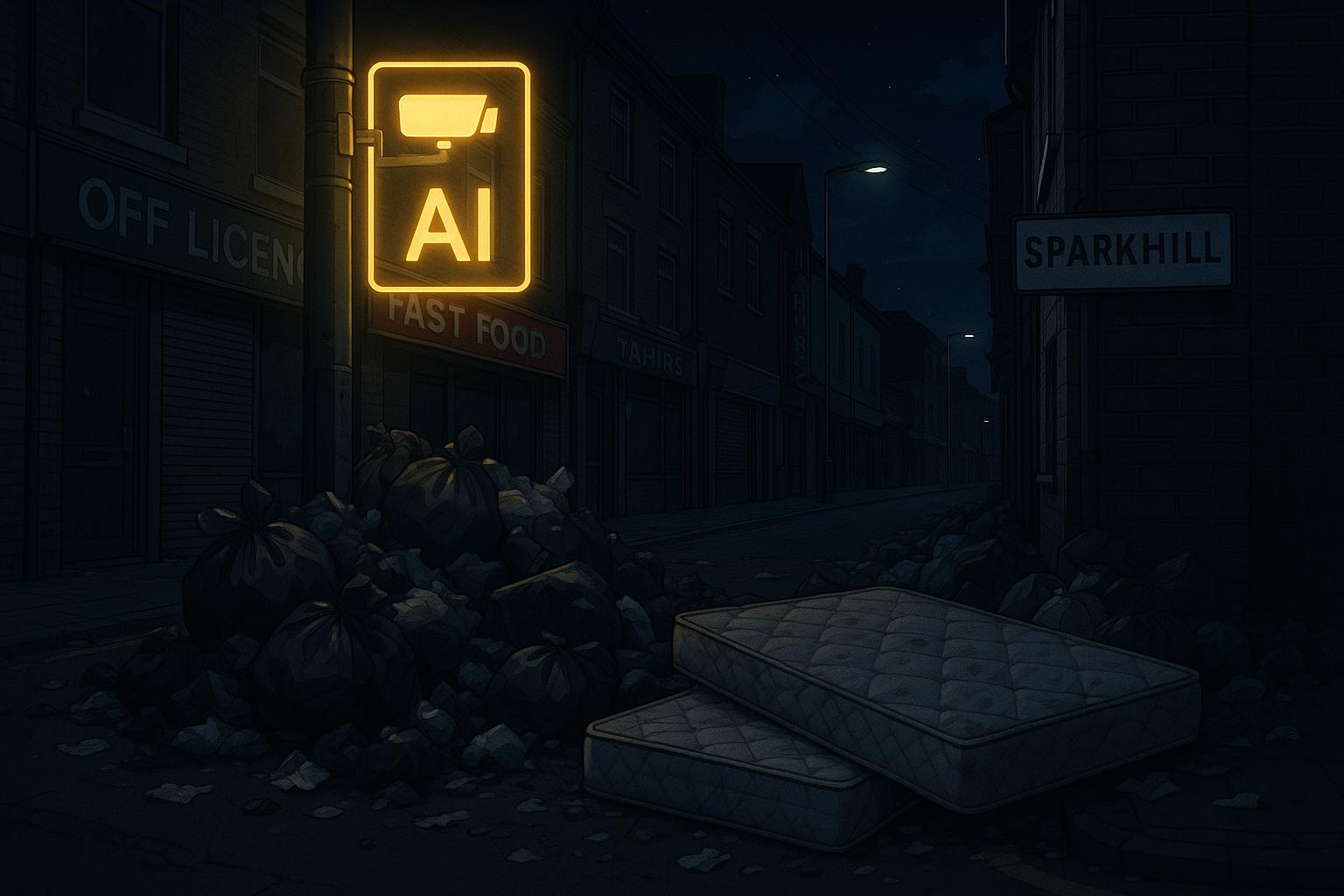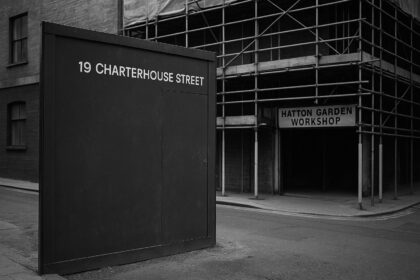Sparkhill residents face a relentless battle against fly-tipping at the notorious Knowle Road and Formans Road junction. Despite regular clear-ups, waste piles up overnight, prompting calls for AI surveillance and stronger enforcement from Birmingham City Council to end the cycle of dumping.
Residents in Sparkhill, Birmingham, are grappling with the persistent issue of fly-tipping, particularly at the notorious junction of Knowle Road and Formans Road. This hotspot has earned a reputation for routinely accumulating mounds of waste, from black bin bags to discarded mattresses, leading locals to call it “carnage.” Irfan Mahroof, who frequently attends the Al-Boukhari mosque opposite the dumping site, highlighted the troubling cycle: “It’s clean during the daytime but by the night-time, people dump again.” This cycle of cleanliness followed by chaotic dumping has created an environment that many describe as both frustrating and disheartening.
Local businesses and residents have appealed to Birmingham City Council for action, emphasising that despite regular clean-ups, rubbish tends to reappear almost immediately. Asif Sheraz from M B Solicitors noted, “It builds overnight,” asserting that the site has become a beacon for fly-tippers. According to the community, effective measures are urgently needed to restore order to their streets. They are advocating for the installation of surveillance cameras combined with strict enforcement to deter offenders. Shabir Hussain, a resident, poignantly stated, “It gets big like a mountain” by morning, underlining the visible impact of this environmental blight on their daily lives.
In response to these concerns, Birmingham City Council has begun to deploy innovative technology to tackle the fly-tipping crisis. Recently, the council installed artificial intelligence (AI) cameras in key areas such as Aston, Erdington, and North Edgbaston, funded by a £45,000 government grant. These cameras are designed to automatically detect dumped waste and notify council officers, significantly speeding up the identification of offenders. This initiative is part of a broader strategy to enhance waste management practices across the city and respond to the pressing issue of fly-tipping, which has reportedly surged in recent years.
The statistics concerning fly-tipping in Birmingham are alarming. The city reported 20.27 incidents per 1,000 people, reflecting a troubling trend that has seen England grapple with over a million fly-tipping incidents in a single year, up 50% over the past decade. Such statistics are perhaps more than just numbers; they are indicative of a deeper environmental and public health challenge. The Local Government Association has warned that fly-tipping not only creates pollution but also attracts vermin and poses significant risks to community safety.
Councillor Majid Mahmood, the city’s Cabinet Member for Environment and Transport, acknowledged the ongoing issues at Sparkhill, stating, “We are working with local councillors and waste enforcement officers to identify the root cause of the problems and to tackle the issue.” He emphasized the city’s commitment to maintaining clean streets and the importance of community involvement in reporting incidents. Community engagement is essential as the council seeks to prosecute offenders whenever possible.
As discussions continue regarding potential solutions, residents remain hopeful that the combination of AI technology and community vigilance may finally lead to a cleaner, safer environment. The immediate priority for many locals is to see actionable changes that will prevent their neighbourhood from becoming a dumping ground, ensuring that future generations can enjoy a cleaner and more pleasant living space.
Source: Noah Wire Services
- https://www.birminghammail.co.uk/news/midlands-news/its-carnage-need-cameras-residents-31647393 – Please view link – unable to able to access data
- https://www.itv.com/news/central/2023-08-03/ai-technology-cameras-installed-to-tackle-war-against-fly-tippers – Birmingham City Council has installed new artificial intelligence (AI) cameras across Aston, Erdington, and Edgbaston to combat fly-tipping. These cameras detect dumped rubbish and automatically alert council officers, streamlining the process of catching offenders. Funded by a £45,000 government grant, the initiative aims to monitor hotspot areas more efficiently and bring environmental criminals to justice. Councillor Majid Mahmood emphasized the city’s commitment to maintaining clean streets and prosecuting those responsible for fly-tipping.
- https://www.birmingham.gov.uk/news/article/1371/using_artificial_intelligence_to_help_clean_up_fly-tipping_hotspots – Birmingham City Council has deployed three AI-powered CCTV cameras in Aston, Erdington, and North Edgbaston to address fly-tipping. Funded by a £45,000 government grant, these cameras detect images of dumped rubbish and automatically alert council officers, eliminating the need to manually review hours of footage. The pilot scheme will be evaluated before expanding the technology citywide. Councillor Majid Mahmood highlighted the council’s dedication to delivering a cleaner and greener Birmingham.
- https://www.ukauthority.com/articles/birmingham-adds-ai-to-cctv-to-combat-fly-tipping/ – Birmingham City Council has initiated a pilot project using AI-equipped CCTV cameras to combat fly-tipping. Three cameras have been installed in Aston, Erdington, and North Edgbaston, funded by a £45,000 government grant. The technology detects images of dumped rubbish and automatically alerts council officers, reducing the need for manual footage review. An evaluation of the pilot will be conducted, with plans to expand the technology across the city. Councillor Majid Mahmood emphasized the importance of monitoring hotspot areas efficiently and prosecuting offenders.
- https://metro.co.uk/2023/02/21/birmingham-this-is-what-two-years-of-fly-tipping-looks-like-18322250/ – A two-year accumulation of fly-tipped waste in an alleyway in Birmingham’s Aston area has led to a 7ft tall pile stretching 100 meters. The rubbish includes car parts, mattresses, fridges, beds, sofas, and other household waste. Residents have expressed horror at the state of the street, with some fearing the pile could catch fire and explode. The Local Government Association has highlighted fly-tipping as a serious public health risk, creating pollution and attracting rats and other vermin.
- https://www.bbc.co.uk/news/uk-england-birmingham-66375533 – Birmingham City Council has installed new CCTV cameras equipped with artificial intelligence (AI) technology to tackle fly-tipping. Three devices have been placed in Aston, Erdington, and Edgbaston. The AI technology detects images of dumped rubbish and automatically alerts the council, reducing the need for manual review of recorded footage. Funded by a £45,000 government grant, the cameras will initially operate under a pilot scheme before being added to the city’s wider CCTV network. Councillor Majid Mahmood emphasized the priority of clean streets for Birmingham residents.
- https://www.expressandstar.com/news/local-hubs/birmingham/2023/08/30/west-midlands-fly-tipping-capitals-revealed/ – A study by Reliable Skip Hire has identified Sandwell as one of the most affected areas by fly-tipping in the West Midlands, with 33.84 incidents per 1,000 people in 2021/22, surpassing the national average of 19.07. Coventry follows with 24.68 incidents per 1,000 people. Birmingham reported 20.27 incidents per 1,000 people. The study highlights the growing concern of fly-tipping in England, with over a million incidents recorded in 2021/22, a 50% increase over ten years. The government has imposed over £7 million in fines during this period.
Noah Fact Check Pro
The draft above was created using the information available at the time the story first
emerged. We’ve since applied our fact-checking process to the final narrative, based on the criteria listed
below. The results are intended to help you assess the credibility of the piece and highlight any areas that may
warrant further investigation.
Freshness check
Score:
8
Notes:
The narrative does not reference any outdated events or persons, and the issue of fly-tipping remains a contemporary concern. The installation of AI cameras is a recent initiative, suggesting the information is relatively current.
Quotes check
Score:
9
Notes:
The quotes from local residents and officials, such as Irfan Mahroof and Shabir Hussain, appear to be original to this context, as they are not widely found in previous articles.
Source reliability
Score:
8
Notes:
The narrative originates from the Birmingham Mail, which is a reputable local news source. However, the lack of corroborating national coverage might affect the overall reliability.
Plausability check
Score:
9
Notes:
The claims about fly-tipping and the use of AI cameras are plausible, given the ongoing environmental challenges in urban areas and the common use of technology in waste management.
Overall assessment
Verdict (FAIL, OPEN, PASS): PASS
Confidence (LOW, MEDIUM, HIGH): HIGH
Summary:
The narrative passes scrutiny due to its contemporary context, original quotes, and plausible claims. The source is a reputable local news outlet, enhancing the reliability of the information.













